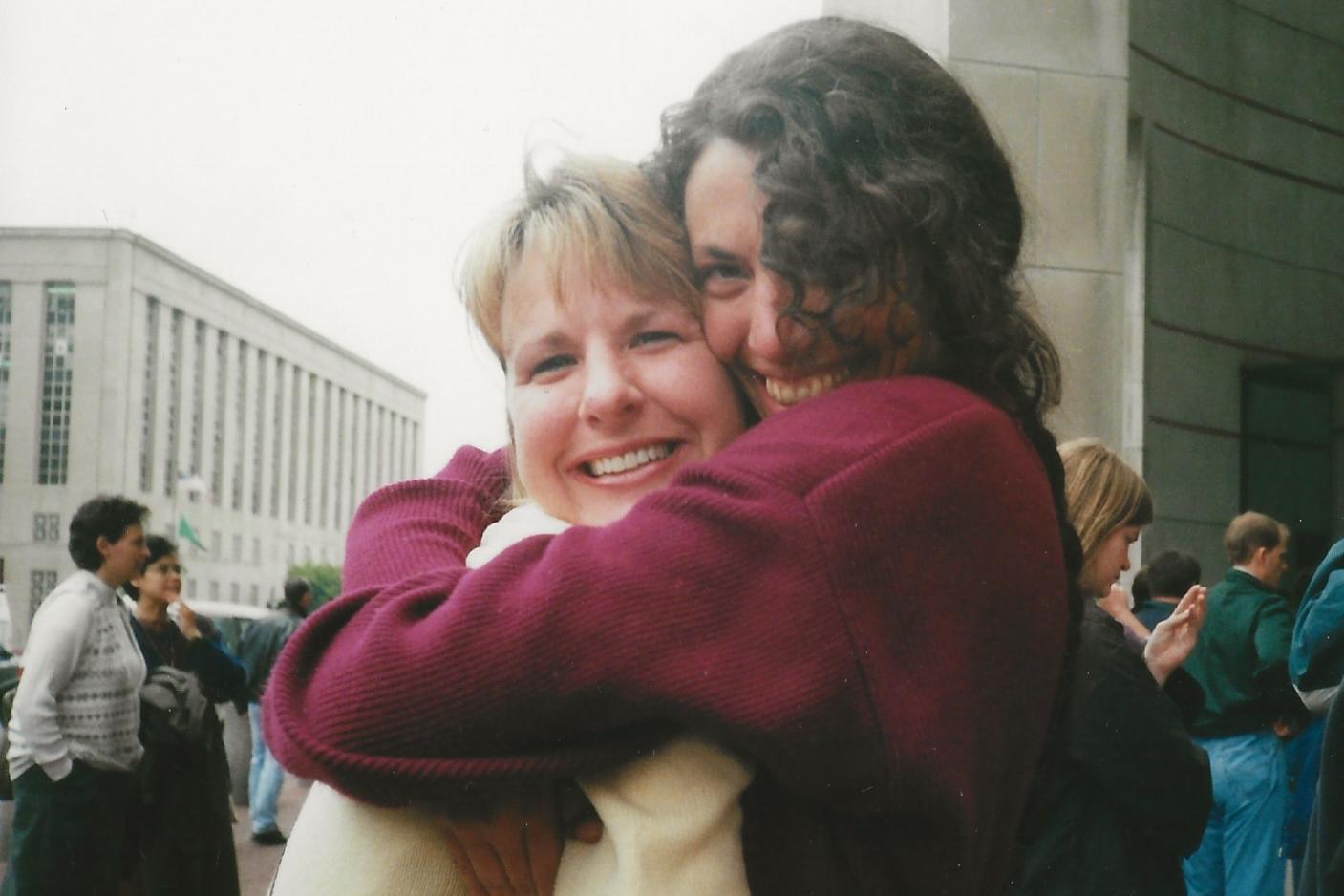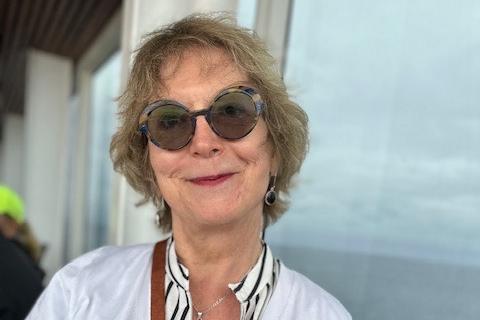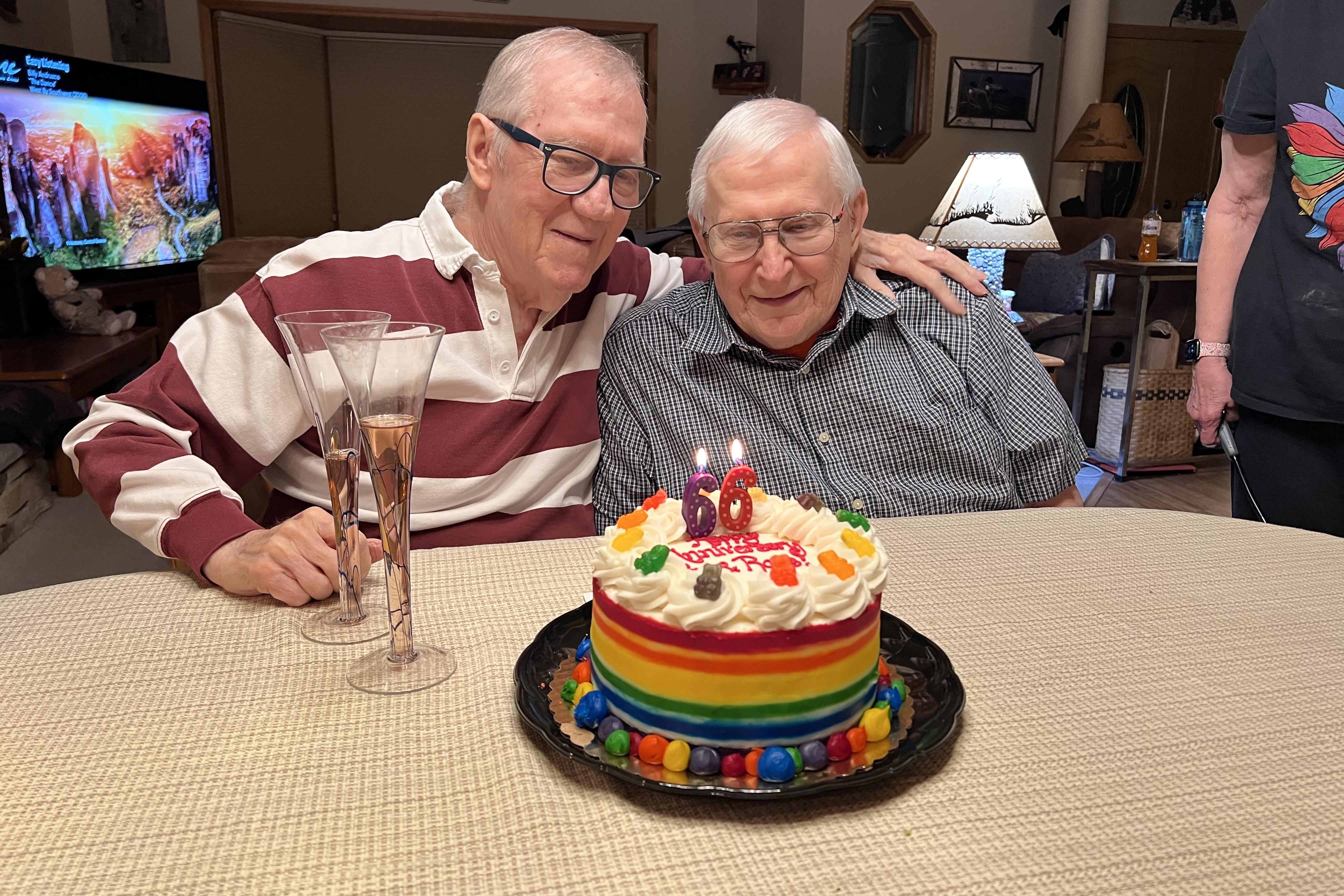
Chuck King: from Wisconsin to Wilton Manors

Chuck King (nee Oswald) was born in Cudahy, Wisconsin in 1972. Most of his family was from South Milwaukee, where he lived during grade school, and Oak Creek, where he moved in middle school. After his parents’ divorce, he lived with his mother until departing for college in 1990.
Breaking boundaries
Chuck attended Oak Creek High School. Although he participated in extracurricular activities, he wasn’t a huge fan of high school culture. He was active in drama and forensics, but soon found a higher calling. When the opportunity arrived sophomore year to attend Cheerleader Camp at Marquette University, he jumped at the chance.
“I made it the first time I tried out,” said Chuck. “I’m 99% sure I was one of the first male cheerleaders in a Wisconsin high school.”
(Of course, Chuck had an early advantage: he’d been a cheerleader at Zion Lutheran grade school years earlier. “They didn’t know how to handle that,” he laughed.)
Chuck spent the last two years of high school working at Six Flags Great America. He met a lot of gay people in the Show Department, where he sang, danced, and played the role of Foghorn Leghorn.
“It was cool to be around so many openly gay people,” he remembered. “Wisconsin was a wonderful place to grow up, but it wasn’t the best place to come out at the time. We wound up going out in Chicago after work with our fake IDs, to places like Manhole and Deek’s. Those were my first gay bars.”
“It was so liberating to finally come out, even if I wasn’t out yet to my family.”
At nineteen, Chuck acquired a fake ID – and instant access to bars in Milwaukee, including the M&M Club, Wreck Room, and Boot Camp.
“Those were my first leather bars, even if I didn’t really understand leather culture at the time.”
Chuck attended UW-Stevens Point but left after his freshman year.
“I hated going to class in two feet of snow,” he said. “I told myself, I’m never doing this again.”
Chuck took a network programming job with CBS Television, which eventually led him to Las Vegas. He decided it was time to come out to his family.
“I had all the books, i.e., ‘Now That You Know,” he said. “I flew home three times to tell them. Finally, I flew home and just did it. I told my mother, who said she already knew, and was glad I finally told her. She’d known ever since I was a baby.”
“My mom was always the coolest mom. She would welcome everyone to Thanksgiving dinner every year if they had nowhere else to go. She volunteered for ARCW throughout the 1990s. I’m sorry to say we lost her about a year and a half ago.”
One of Chuck’s favorite memories of Milwaukee was meeting Bill Wardlow at the Wreck Room. They played on the Triangle softball team together for one season that ended at the Gay World Series.
“I loved the Wreck Room,” said Chuck. “It made me realize that the appeal of sleazier atmospheres over shiny, bright, colorful dance clubs.”
“I had outgrown Milwaukee, and I knew that,” said Chuck. “But it will always have a special place in my heart.”
Chuck left entertainment for the casino business. He opened the Hard Rock Hotel and Casino, where he also worked as a blackjack dealer. He visited many of the hottest clubs and bars, where he learned a lot about people, space and flow. He worked on a few events at the Las Vegas Eagle.
But eventually, he knew it was time to go.
“I was a 20something making a six-figure salary in Vegas during one of the biggest Vegas boom times ever,” he said. “I did a lot of things I shouldn’t have done. If I didn’t leave Las Vegas, I wouldn’t have survived much longer. But I have no regrets.”
The death -- and rebirth -- of the Baltimore Eagle
After a short art school stint in Phoenix, King moved to York, Pennsylvania where he became bar manager at Club XS for six years. The owner, who was also the longtime owner of the Copa Key West (1978-1995,) became his friend and mentor. After meeting future husband Greg, and relocating to Baltimore, Chuck began to think about opening a place of his own.
(Note: After some legal issues, Club XS lost its liquor license and was ordered to close in 2012. Four years later, the last surviving gay bar in York closed forever.)
“The Baltimore Eagle had been open for 20 years, and it was in pretty bad shape,” said Chuck. “It was rundown, dilapidated, and badly in need of a facelift. We struck a deal with the landlord, I got investors involved with the building, and we relaunched the legacy brand.”
“I wish we knew then what we know now,” said Chuck. “We quickly found ourselves in legal battles with the landlord. They called him the Trump of Baltimore, but of course we didn’t know this until it was too late. We found all sorts of lawsuits against him for running sham businesses, real estate scams, code violations.”
“Every two weeks, his attorney would send us letters threatening to terminate the lease for minor infractions,” he said. “This went on for 18 months. He wanted us out because he was trying to get loans against the property. But we’d paid for those improvements, not him, and the banks knew that.”
“It was the most stressful time of my entire life. I had seventy-five workers – and I had to let them all go. The Baltimore Eagle closed in July 2018.”
Building a lasting legacy
Although the bar closed, Chuck’s charitable legacy lives on with the Black White Party Foundation. Over the years, the four-day weekend event has grown into a national non-profit organization. The foundation, which Chuck founded, has reinvested over $100,000 in charitable causes, including support programs for transgender folx, people of color, holistic HIV/AIDS care, community centers, and Rainbow Railroad. The 501c3 board also oversees organizations like Pennsylvania Pride, Capital City Bears, and Bears, Bikers, and Mayhem (which has grown so large year over year, it’s relocated from York to Gettysburg to Hunt Valley, MD.)
In October 2018, Chuck and Greg moved to Wilton Manors, Florida. They seized the opportunity to reinvent Club Silver – a “really old man piano bar” – into the Eagle Wilton Manors, which opened in October 2019.
“The business was right in the center of the drive,” said Chuck. “And yet, it closed after six months. We came in and completely reinvented it: we added walls, glass, soundproofing, and even completely new rooms. We invested everything we had to create this space. We wholeheartedly believed in what we were creating.”
“I’m the kind of guy that rolls with it until I figure it out,” said Chuck. “You know, fake it until you make it! I always come into a situation open minded -- and that’s the best thing that’s ever served me in every situation, every job, every city.”
Rising from the ashes
“It’s true that a lot of gay bars have closed, even in cities like Chicago, Los Angeles, and Wilton Manors,” said Chuck. “But I’m a firm believer that bars close when they aren’t constantly reinventing themselves. You must constantly update your space, and keep people coming back, because gay people are a finicky group. You can be a hot spot tonight, and tomorrow night people will refuse to come there.”
“Another consideration is that old school leather bars were so male-centric and so hyper-masculine,” he said. “The world has moved from exclusive to inclusive. We welcome everyone with open arms as long as you respect our space. We created a business model in Baltimore that offered a dance club, main bar, a separate code bar, a store, and a restaurant. It can be hard to manage so many revenue streams, but it worked remarkably well here in Florida.”
“For me, it was all about creating a space in the fetish world for people who are serious about rubber, leather, uniform, and more – a phone-free space where everyone feels safe, but where they have to talk to each other without technology.”
“If I could turn back time, I would have skipped Baltimore and came straight here,” said Chuck. “Yes, Wilton Manors is a gay bubble, but there’s tremendous revenue in this bubble, and you don’t have to work quite as hard to survive. But at the same time, it’s harder because you must keep it fresh and keep it moving.”
“You also have no excuse for being culturally incompetent. We trained our staff on what top notch customer service looks like to LGBTQ people. We hold everyone accountable for our inclusion promise. Be You is our motto. Be whoever you are. We mean that – and it’s served us well.”
“We do get some women in the bar,” said Chuck, “and we pull them aside and let them know this is a safe and sacred space. This is not a zoo. This is not a place to scream and yell. Everyone must follow the same rules in our bar. Have fun but know where you are and behave accordingly. As a private space, the code bar protects people who are part of this world -- by keeping out the people who aren’t.”
Chuck sees inclusion as an opportunity to educate and influence allies.
“With Governor DeSantis attacking everything and everything, we must constantly remind our straight customers that we’re under attack,” said Chuck. “If you don’t want places like the Eagle to go away, be a good ally, understand that this is our space, and support us. You can go anywhere in the country and act however you want. We have limited spaces and they’re special to us. Be our allies. Be our advocates. Step up to the plate and help us with the cause.”
“We have such great protections in Wilton Manors,” said Chuck, “but the rest of the state is much more scrutinized. The LGBTQ community has tremendous political power in our area. DeSantis can operate like a dictator, but his approval ratings are lower than ever, and mayors aren’t enforcing his mandates. Mark my words, he won’t be re-elected, and he won’t be president. Florida has had enough.”
Changing times
Like the national gay bar landscape, the leather scene has evolved in recent years.
“When I first came out in the leather world, it was very old guard,” said Chuck. “You had to follow the traditions and protocols very closely. People wore head to toe leather. If you wanted to play with a guy, and he was a boy or a slave, you had to be cordial and get permission and go through this entire process. Today, the consent process has really changed, and its now on a one-on-one basis. You don’t need someone else’s permission to do things: it’s your choice and your choice alone.”
“Second of all, old guard leather had so many rules. Black leather, this shirt, tie if you’re a top… but the younger people don’t want all that. New leather has very few rules. Guys come to the bar in a harness, jock strap, and tennis shoes. They have a wonderful time. Guys come to the bar in leather pants. And that’s okay too. It’s all about being comfortable, feeling sexy in whatever you put on, as long as you’re healthy, confident, and happy. That’s what people are doing. It’s a mix nowadays: harnesses come in every color. All the rules have changed and it’s much more inclusive.”
“The pup community helped drive a lot of that. Puppies tend to be introverts, so the hood allows them to come out and be comfortable while remaining anonymous. This really expanded the leather community.”
“Finally, the community is wildly diversifying. It’s not just white, male or cisgender anymore. In the 1990s, you’d see very few Black, Hispanic, or Asian men in leather bars. Now it’s anybody and everybody. Trans folks are more welcome than ever. Personally, I love it spicy, wonderful, and intriguing. It’s boring to run a bar where everyone looks just like you.”
After successfully surviving the pandemic, the Wilton Manors Eagle is thriving more than ever. GayCities recently named the Eagle one of the top six gay clubs in the United States. And it’s become a benchmark for new Eagles as they prepare to leave the nest:
“When the Austin Eagle was getting ready to open, they came down and studied our model,” said Chuck. “They wanted a reinvigorated sense of community for their bar. People still need and want community, but they’re tired of the same old same old. Places like the Austin Eagle are breathing new life into this world, and I was personally so honored to be part of their project.”
“We will always need our sacred spaces,” Chuck concluded. “We will always need places where we can be seen. These places will always have meaning and purpose.”
Words of wisdom
Now a proud fiftysomething, Chuck shows no sign of slowing down. Nearly half a lifetime after being diagnosed with HIV, he’s living his best life, traveling the world, making his dreams come true, and making a tremendous impact on multiple communities. He was recently featured in the book Who Needs Gay Bars? (Greggor Mattson, 2023)
After nineteen years together, he and his husband Greg recently divorced on the best terms possible.
“We are best friends, and great business partners, but our relationship reached its natural expiration date,” he said. “We recognize that’s no reason to kill the great stuff we’ve done together – and continue to do together.”
In September, Chuck, Greg, and a business partner opened the Cake Daddies bakery on Wilton Manors Drive. And he’s actively searching for the next place to open a new bar.
“Our business model works, and I want to bring it somewhere that needs it,” said Chuck. “If I had a billion dollars, I’d take it to Dallas, or Denver, or Detroit. It might be an Eagle, and it might not be. It might be something else completely.”
What advice does he have for the next generation of LGBTQ business owners?
“If I could go back and tell my younger self something, I’d tell them to talk to the locals. Talk to the people who love it. Talk to the people who’ve done it. They’ll know everything you need to know, and they’ll give you the best advice. I’ve bartended in Milwaukee, Phoenix, Baltimore, York, and Pompano Beach over the years, and this is a universal truth. You don’t do this naturally as a kid, because you think you’re cute and know everything, even though you know nothing.”
“Keep an open mind, an open heart, and soak up as much as you can.”
 Chuck King (2023)
Chuck King (2023)
recent blog posts
April 06, 2025 | Michail Takach
Camille Farrington & Vicki Shaffer: standing up for students
March 31, 2025 | Amy Luettgen
March 29, 2025 | Michail Takach
The concept for this web site was envisioned by Don Schwamb in 2003, and over the next 15 years, he was the sole researcher, programmer and primary contributor, bearing all costs for hosting the web site personally.




